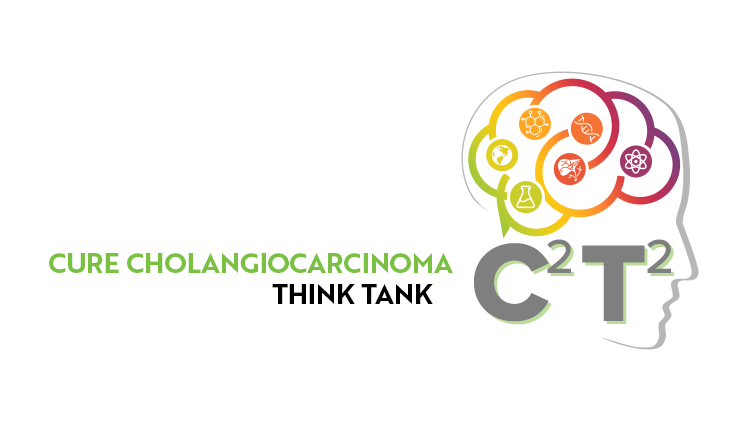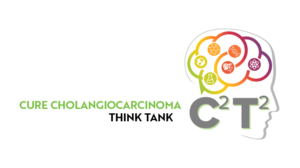
Innovative ‘think tank’ comprised of cholangiocarcinoma experts to meet to develop concrete project ideas to advance the field
Twenty-nine expert scientists and clinicians from the world’s leading academic institutions are convening in Las Vegas for the first time in a three-day meeting, Cure Cholangiocarcinoma Think Tank (C2T2). The working meeting, May 12-14, was made possible through generous donations to the Cholangiocarcinoma Foundation, the premier global resource in research, education, and public awareness of the rare disease.
Cholangiocarcinoma is a type of cancer that forms in the slender tubes called bile ducts that carry the digestive fluid bile. Bile ducts connect the liver to the gallbladder and to the small intestine. An estimated 10,000 Americans are diagnosed each year with the lethal cancer that has a poor prognosis and high mortality rate. A recent study (JAMA Network Open) estimates that by 2040, liver and bile duct cancer will be the third deadliest cancer in the United States.
“Novel platforms in precision medicine and immuno-oncology are catalyzing change at an unprecedented pace in oncology. As a scientific community, we must harness these tools to their fullest extent,” said Dr. Mitesh J. Borad, C2T2 Chairman and director of the GI Cancer Gene Therapy and Oncolytic Virus Lab at Mayo Clinic Cancer Center in Phoenix.
He continued, “In an effort to make tectonic shifts to rapidly achieve a cure for cholangiocarcinoma, there will also need to be bolder and more ambitious thinking. Towards this end, the C2T2 initiative will bring together cholangiocarcinoma disease experts, with expertise from external disciplines, in a highly collaborative and dynamic forum.”
C2T2 is not a typical academic conference or symposium designed around a series of didactic talks, data sharing, and discussions around broad themes. The meeting is an opportunity for a
multi-disciplinary group of experts to develop specific research proposals designed to answer concrete questions and advance near-term impact for patients. Because of the leadership of the Foundation and key donors, there is funding support available for the projects that are developed and prioritized by the group.
The topics that have been selected for this first C2T2 meeting reflect specific areas of urgency and opportunity for improving outcomes for people impacted by CCA – precision early diagnostics and prevention and precision therapeutics (especially in the immune-oncology space). In both cases, the science has advanced to the point where addressing key knowledge gaps in these two areas could have measurable and profound impact on the trajectory of CCA moving forward. Because of that, it was also vital that experts in cancer early detection and precision therapeutics from outside the CCA landscape participate in C2T2 to transfer their experience so the Foundation extended special invitations to these individuals.
“With the vast amount of biological data being generated, new pioneering technologies, coupled with our improved understanding of how cancer develops and propagates, we are at a crossroads for how to use this knowledge to improve outcomes for outpatients,” said Dr. Nilo Azad, an associate professor of oncology and a member of the Gastrointestinal Oncology Program within the Sidney Kimmel Comprehensive Cancer Center. “The C2T2 meeting is geared towards making tangible progress in cholangiocarcinoma for patients now, harnessing the expertise of leaders in cancer research across disciplines.”
The event includes a keynote address by world-renowned Dr. Aristides Patrinos. Patrinos is a member of the Novim Group and the chair of its scientific advisory board. He is also a visiting scholar at the New York University Center for Neural Science. From 1976 to 2006, Patrinos served in the US Department of Energy (DOE) and several of the DOE National Laboratories and engaged in R&D for several facets of energy production and use and led key research programs in biology, medicine, and the environment, including global climate change. He played a leading role in the Human Genome Project and has been a central architect of the “genomics” revolution. A complete list of C2T2 attendees is available upon request.
C2T2 is planning subsequent meetings with outcomes to benefit current and future CCA patients, caregivers and their loved ones with anticipated developments to improve methods of early detection, advance treatment options and improve quality of life and overall survival. Future meetings are expected to take place to drive momentum towards a cure.
“In an effort to make tectonic shifts to rapidly achieve a cure for cholangiocarcinoma, there will also need to be bolder and more ambitious thinking. Towards this end, the C2T2 initiative will bring together cholangiocarcinoma disease experts, with expertise from external disciplines, in a highly collaborative and dynamic forum.”
-Mitesh K Borad
C2T2 Chairman and Director of the GI Cancer Gene Therapy and Oncolytic Virus Lab at Mayo Clinic Cancer Center
